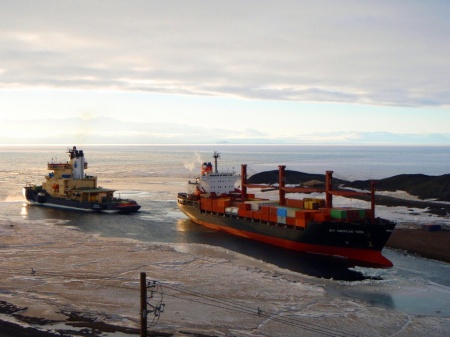An important collaboration is afoot that is likely to have significant impact on the international shipping industry. Researchers at the Viterbi School of Engineering at the University of Southern California (USC) teamed up with the Tai Chong Cheang (TCC) Institute for Emissions Reduction in Marine Diesel Engines in Hong Kong. With TCC funding, USC engineers have developed a “potentially game changing”[1] innovation which enables greater efficiency in marine diesel combustion using a transient plasma ignition system.
 Traditional marine diesel engines burn bunker fuel at 35%-40% efficiency.[2]Applying the transient plasma ignition (TPI) system increases fuel efficiency (by how much is yet to be determined), saving shipping companies money by reducing fuel costs and helping them meet increasingly rigorous international emissions-reducing standards.
Traditional marine diesel engines burn bunker fuel at 35%-40% efficiency.[2]Applying the transient plasma ignition (TPI) system increases fuel efficiency (by how much is yet to be determined), saving shipping companies money by reducing fuel costs and helping them meet increasingly rigorous international emissions-reducing standards.
I am not going to try to explain how TPI works but if you want to puzzle it out see the article footnoted below. TPI technology has already been successfully applied to automotive and aerospace engines with positive results.[3] Applying it to marine diesel engines is a next step with big “real world” applications.
USC engineers announced their promising research in transient plasma back in May of 2012 at the China Maritime premier trade show in Hong Kong. The news was exciting for the world of maritime trade, especially as the USC engineers are one of the few groups working on a practical solution to the issues raised by the international import/export industry. “USC’s is the only serious effort that is actually working on the problem to make the fuel burn better,” said Captain Vinay Patwardhan, TCC’s director of Group Operations Development and General Manager.[4]
Overseas freight forwarding is the number one method for moving trade goods, and it also accounts for a significant portion of the total amount of greenhouse gas-emitted into the atmosphere. Most carriers are powered by low-speed, low-efficiency engines which run on fossil fuels. As the international community applies greater and greater pressure to the shipping industry to do business in an environmentally sustainable way, the challenge stands to find ways to make shipping less damaging for the environment without prohibitively costly innovations.
This is where TPI really shines. The systems needed to operate TPI technology are relatively inexpensive and can be installed in existing engines without the need for major retrofittings. This offers “a potentially low-cost and lightweight technology that could be back-fitted into existing engines, and profoundly influence the design of future generations of more efficient engines.”[5]
Now TCC and the Viterbi engineers have entered the 3rd phase of their research project, which will move from successful tests under laboratory conditions to attempting to recreate those successes in a full-scale working marine diesel engine. If they are able to increase fuel efficiency and reduce greenhouse gas emissions in real engines at an affordable price then it seems the international shipping business is ready to implement it.
Shipping companies know how much is at stake. The world wide economic slump hit the shipping industry particularly hard. Overcapacity has plagued carrier companies and still presents a challenge to freight forwarders, especially the smaller companies. Environmental standards are consistently increasing as international organizations as well as individual nations have instituted rules and regulations requiring greater environmental responsibility by industry players.
“We really need to get transient plasma ignition technology to the world’s merchant fleets as fast as possible,” said Kenneth Koo, TCC Group Chairman. “The survival of trans-oceanic shipping that enables the global exchange of goods and raw materials depends upon it, and as a social responsibility, we need to also do our part to minimize the impact of shipping on the environment.”
Since it looks like our use of fossil fuels isn’t going to go away any time soon, it makes sense to squeeze greater efficiency out of these fuels, giving other engineering teams time to develop alternative energy technologies that are both practical and affordable.
With my wife being a UCLA Bruin, I may get in trouble for inserting this here; but, go Trojans!
